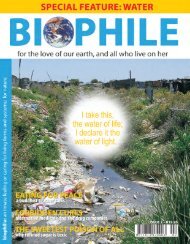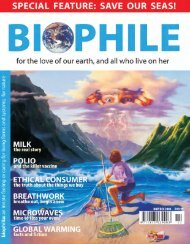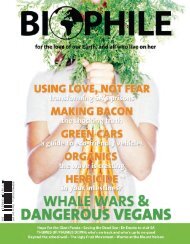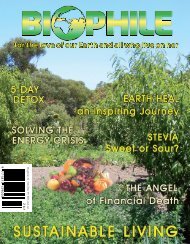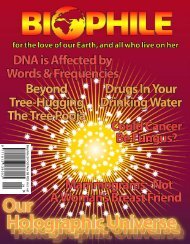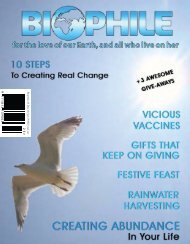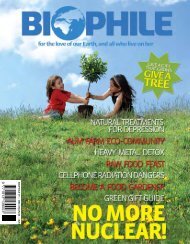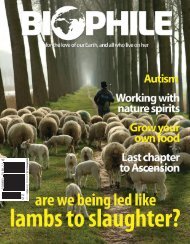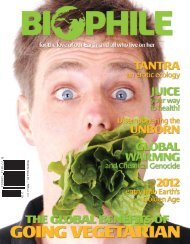BIOPHILE 16 â JUNE/JULY 2007 R25 - Biophile Magazine
BIOPHILE 16 â JUNE/JULY 2007 R25 - Biophile Magazine
BIOPHILE 16 â JUNE/JULY 2007 R25 - Biophile Magazine
- No tags were found...
You also want an ePaper? Increase the reach of your titles
YUMPU automatically turns print PDFs into web optimized ePapers that Google loves.
GEM: THE GLOBAL ECOVILLAGE MOVEMENTand you have a sure recipe for ruin.Admittedly, there are many nobleattempts at sustainability within citiesand towns — even entire ecovillages.Yet, the question remains as towhether the inevitable demands ofdensely populated areas can ever betruly sustainable vis a vis the producerconsumerimbalance. As we graduallybecome more aware of this imbalanceand how we often unconsciously orunwillingly support it, the motivationto “become the change we want to see”and the wish to live “closer to nature”will naturally result in the re-designingand re-organising of human lifestylesand settlements. Ecovillage living leadsus to experience directly the results ofall that we produce and consume in atruly holistic manner.Bioregionalism, which is to have allyour basic requirements met withinwalking or bicycling distance, is neverso pertinently addressed as in an ecovillagesetting. And the more diversethe community, the more chance thatgoods and services go way beyond basicneeds to manifesting an exceptionallyrich and stimulating environment withclose friends, health care, entertainment,meaningful employment, socialand community functions, theatre,art, dance, and spiritual practice- allprovided with minimal impact on thenatural environment. The point is thatwhether we embrace this lifestyle as anecessity or not, ecovillage living simplyoffers far more satisfying life conditionsthan the dominant Western model, as acloser examination would demonstrateto any curious citizen.As yet, South Africa still only has ahandful of emergent ecovillages thoughthere is certainly growing interest. Theclimate, available land and abundantsolar energy certainly offer impressiveprospects for self-sufficient communities...While, in theory, an ecovillage maysound enticing and straightforward, thereality is that to pioneer an ecovillagerequires persistent conscious attention,physical work, commitment and patience.It’s a little known fact that 90%of all intentional communities disbandor peter out within the first few years.Even as the challenges are indeed manifold,the biggest obstacle for many is tonurture and maintain an environmentthat grows harmoniously in the face ofinterpersonal dynamics.One of the prominent concerns ofour modern culture is our fragmentation.Due to our conditioned socialalienation, when we come into an communalenvironment where we are requiredto integrate other people’s viewsand choices into many decisions thatwere previously made autonomously,we often feel that our sense of personalfreedom is threatened or compromised.It is said that through moving from thePiscean into the Aquarian age, we willfind much of our spiritual growth andtranscendence through our relationshipsand social interactions.Our progressive attitude towardsdisagreement and conflict finds aninvaluable platform in intentional community.Through conflict we are invariablyconfronted with our own personalissues and mental conditioning. Byhonouring adversity as an opportunityfor growth, through honest communicationand commitment to resolution, weare confronting, on a practical level, ourmost deeply conditioned illusion of beingseparate from all that is.The GEM is like a blueprint that’s beingchanneled on a planetary level, forhumanity to not only continue living,but to flourish to our full potential asspiritual beings in the heavenly gardenof Gaia. Through GEM’s crystalisationwe are preparing the space for thebirthing of a New Culture. Intriguingly,as human consciousness evolves, sodoes the GEM proportionately gainmomentum and as this global shiftbecomes more prevalent, we are naturallydesigning and creating the mostcongenial environment for its manifestation.In the larger scheme of things it’squite uncanny how, in the entire historyof humanity, we have simultaneouslycome to two precipices: One loomingover a massive ecological cataclysmfuelled by an escalating war for theresidual natural resources and furtherextreme examples of human ignorance;the other, a juncture in human evolutionwhere we can release the colossal,yet subliminal, burden of fear and soarto an unprecedented realisation of consciousness.In truth, the former cannotbe prevented without the latter.The time for integrating ecologicaland spiritual consciousness is uponus and if we wish to welcome it into aspace that truly nurtures and reflectsour interconnectedness with all lifesystems,then it is up to us to create it.References:Ecovillage Living- Restoring the Earth and her People,edited by Hildur Jackson and Karen SvenssonCreating a life together, by Diana Leafe ChristianCreating Harmony, edited by Hildur JacksonResources:www.gaia.orgwww.ic.orgwww.context.orgKhulaDhammaEcovillageby Yan(Khula DhammaEcovillage, Eastern Cape)The name “Khula Dhamma” consistsof the Xhosa word “khula”, whichmeans “to grow” and the ancientEastern word of “Dhamma” which hasvarious spiritual connotations such as“the natural, universal law” and “thepath that leads to enlightenment”.Since, as a community, we do notidentify ourselves with any oneparticular philosophy or belief systemwe generally convey our name as“to grow on the path that leads toconsciousness.”To grow and exploring consciousnessare indeed the two fundamentalaspects of our ecovillage. First andforemost we embrace the profound andunique opportunity for human beingsto overcome fear and the illusion ofbeing separate from all that is. One outwardmanifestation of this is reflectedthrough how we relate to one another,share enthusiasm and ideas, toleratedifferences and how we approach andresolve opposing views. The other isthe surrounding environment we havechosen to live in (or perhaps it was theland who chose us!) that allows us toreconnect with Nature.Through investigating the causesand acknowledging the current realityof how we, as human beings, havebecome alienated from our true nature,each other and our natural environment,we are deeply moved to healthese wounds of ignorance and work torestore the sacred natural balance.(continued on page 43)How we grow our food, build ourdwellings, gain our livelihood, generateour electricity, use our resources,manage our waste, choose which goodsto purchase etc. are all done with theaim of constantly reducing our impacton the Earth and her creatures. As withour relationships, we are still far fromperfection — if there is such a thing!But this is our intent.Our ecovillage is still very much inthe embryonic stage. Only in the last22 <strong>Biophile</strong> Issue <strong>16</strong>



